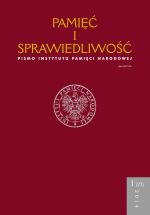Partia, ideologia i wywiad polityczny. Studium funkcjonowania organizacji partyjnej w wywiadzie Ministerstwa Bezpieczeństwa Publicznego
Party, Ideology and Political Intelligence. A Functional Study of the Communist Party Organization in the Intelligence Service of the Pol- ish Ministr
Author(s): Sławomir ŁukasiewiczSubject(s): History
Published by: Instytut Pamięci Narodowej
Keywords: Poland; ideology; communism; party; intelligence; Ministry of Public Security
Summary/Abstract: Since 1944, after coming to power in Poland, the Communist Party interfered in all spheres of political, social and cultural life. Party units operating in institutions and workplaces constituted one of the tools of that interference, subordinated to the communist ideology. The paradox was that similar units of “ideological sur- veillance” were also formed in the civilian intelligence structures of the Ministry of Public Security. It was one of the ideological surveillance mechanisms used to exert pressure which affected the nature of information collected and transferred to the authorities. It often had more to do with propaganda than with reliable, objectified knowledge. Materials of the Seventh Department, i.e. the MBP civilian intelligence, contain minutes of meetings of these party units which shed much new light on the functioning of the intelligence, as well as its relations with the central structures of the party. Intelligence became part of the repressive appara- tus, and it was repression that became a priority, not the informational activities. Right political attitude became more important than the credibility of intelligence information. Intelligence, like the entire state apparatus, was to search for and eliminate the “enemies of the people,” provide information in accordance with the doctrine, and what is more, it was also supposed to take care of the ideological purity of its own staff. Contrary to democratic states, control mechanisms were subordinated to the ideology. Insufficient ideological control and wrong personnel policy was one of the reasons for the reorganisation of the intelligence structures carried out in the early 50s.
Journal: Pamięć i Sprawiedliwość.
- Issue Year: 23/2014
- Issue No: 1
- Page Range: 217-246
- Page Count: 30

